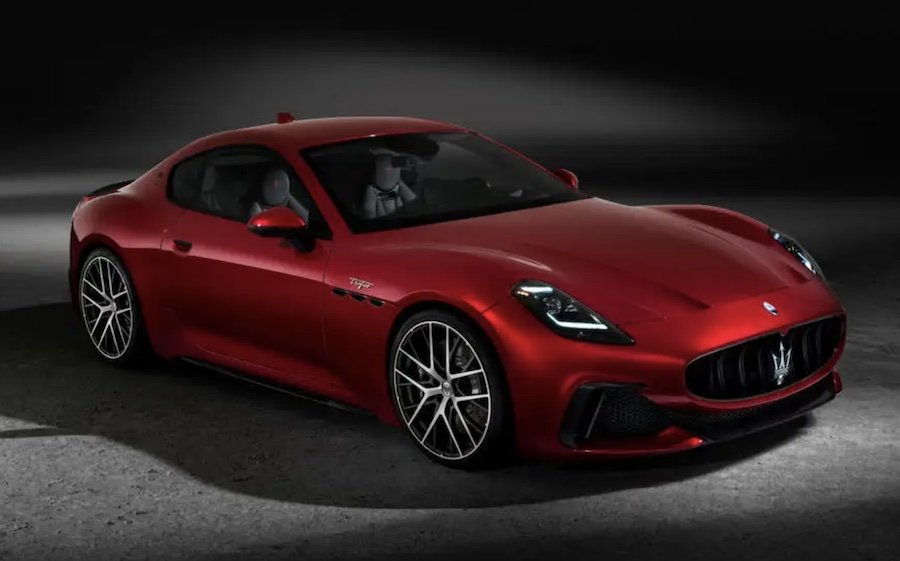2023 Maserati Granturismo EV to arrive with 280-mile range

The Maserati Granturismo has returned for a second generation, bringing both electric and V6 powertrain options in an effort to shake up the luxury GT segment and reestablish Maserati as a leading sports car manufacturer.
The 2+2 electric Granturismo, called Folgore (for lightning), is equipped with more than 745bhp and 997lb ft of torque, can sprint from 0-62mph in just 2.7sec, and has a WLTP official range of 280 miles. Priced from nearly £200,000, it is Maserati’s long-awaited answer to the Porsche Taycan and will arrive as part of the marque’s rapid-fire electrification push, which will phase out combustion power entirely from 2030.
The Folgore is powered by a 93kWh (83kWh usable) T-shaped battery, hooked up to three in-house-built motors (one on the front axle and two at the rear), which allow for both rear- and four-wheel drive. The battery can be charged at speeds of up to 270kW, putting it among the fastest-charging EVs on sale.
A flexible new architecture – unrelated to that used by the old V8-powered Granturismo – will form the base of the Folgore and its V6 sibling. The bespoke chassis will also be used on other Maseratis, including the already revealed Grecale Folgore EV, with the battery placed low and along the centre of the chassis for the optimal weight distribution (the Folgore gets 50:50) and centre of gravity.
The V6 car has its engine just behind the front axle, while the drivetrain takes up the space used by the battery. The Folgore weighs 2260kg and its V6 sibling is 1795kg (78kg less than the lightest, MC-spec GT from the previous generation).
Maserati’s head of global product, Massimo Capaldi, said he expects the Folgore to attract a new type of customer to the brand – as well as, the company hopes, nabbing Tesla Model S Plaid and Audi RS E-tron GT buyers.
The firm’s goal is to have a “completed” electric range by 2025, including an electric version of the Maserati MC20 flagship supercar.
However, Capaldi told Autocar that Maserati was not yet ready to ditch combustion completely for the Granturismo, which he called the “pillar of the brand”, hence the launch of the petrol version fitted with the same twin-turbocharged 3.0-litre Nettuno powerplant used in the MC20, albeit detuned.
Costing around £50,000 less than its electric sibling, the Granturismo Nettuno gets 550bhp (71bhp less than the MC20), 479lb ft and a 0-62mph time of 3.5sec in top-flight Trofeo form. A Modena variant with 489bhp and 443lb ft will also be available. Its closest rivals – the Aston Martin Vantage, McLaren GT and Ferrari Roma – are currently on sale with V8s only.
Noticeable differences between the V6 and EV models include a subtly tweaked front bumper and quad pipes at the rear. The V6 car also has a bigger boot than the EV, in which space is given up to accommodate its rear motors.
The changes inside are also "more dramatic" than the version it succeeds. Lifting the interior covers three months after the car's inital reveal, the inside of the car is very similar to the the larger Grecale SUV.
This includes a smaller steering wheel, a new 12.0in digital dashboard and a pair of infotainment screens stacked in the centre of the dashboard (top for entertainment and bottom for “comfort” features). The screens flank physical buttons that control the automatic gearbox. The staple analogue clock has been replaced by a digital display with interchangeable faces. An interactive voice assistant is also fitted. Autocar's editor-at-large Matt Prior described it as a "very nice place to be" when he tested the Granturismo Folgore.
However, the most defining difference, apart from the powertrain, is the sound. In place of the Nettuno’s charismatic V6 exhaust note, the Folgore will have external and internal speakers that will pump out a “unique” soundtrack, similar to a fusion of electric whirrs coupled with a V8 engine. “It is a new concept that can’t be likened to anything else,” said chief engineer Davide Danesin.
But the feature Danesin is most proud to showcase is the Vehicle Domain Control Module (VDCM), which allows drivers of all abilities to get the most out of both cars. Developed in-house, it adjusts the level of electronic support according to the drive mode selected: Comfort/Max Range (depending on the powertrain), GT, Sport or the most extreme setting, Corsa.
“This is a good thing today, but also a huge investment for the future,” said Danesin. “You can really let the system provide [the help to use all the performance] with any skill level.”
Despite the technical reinvention, the new Granturismo bears a strong visual resemblance to the previous car, which bowed out in 2019. The sleek, long-bonnet, cab-back stance remains, even on the engineless Folgore version, with a new treatment for the front and rear end bringing the GT most obviously into line with Maserati’s new design language, as pioneered by the MC20 and Grecale.
Final prices for the two Granturismo variants will be revealed closer to their respective launches: the V6 car will arrive in spring 2023 and the EV in the second half of the year.
The limited-run First Edition car – expected to command around a £50,000 premium – is already proving “very popular”, according to Maserati, but the firm has yet to fully outline its sales aspirations for the second-generation GT family.
Nouvelles connexes


